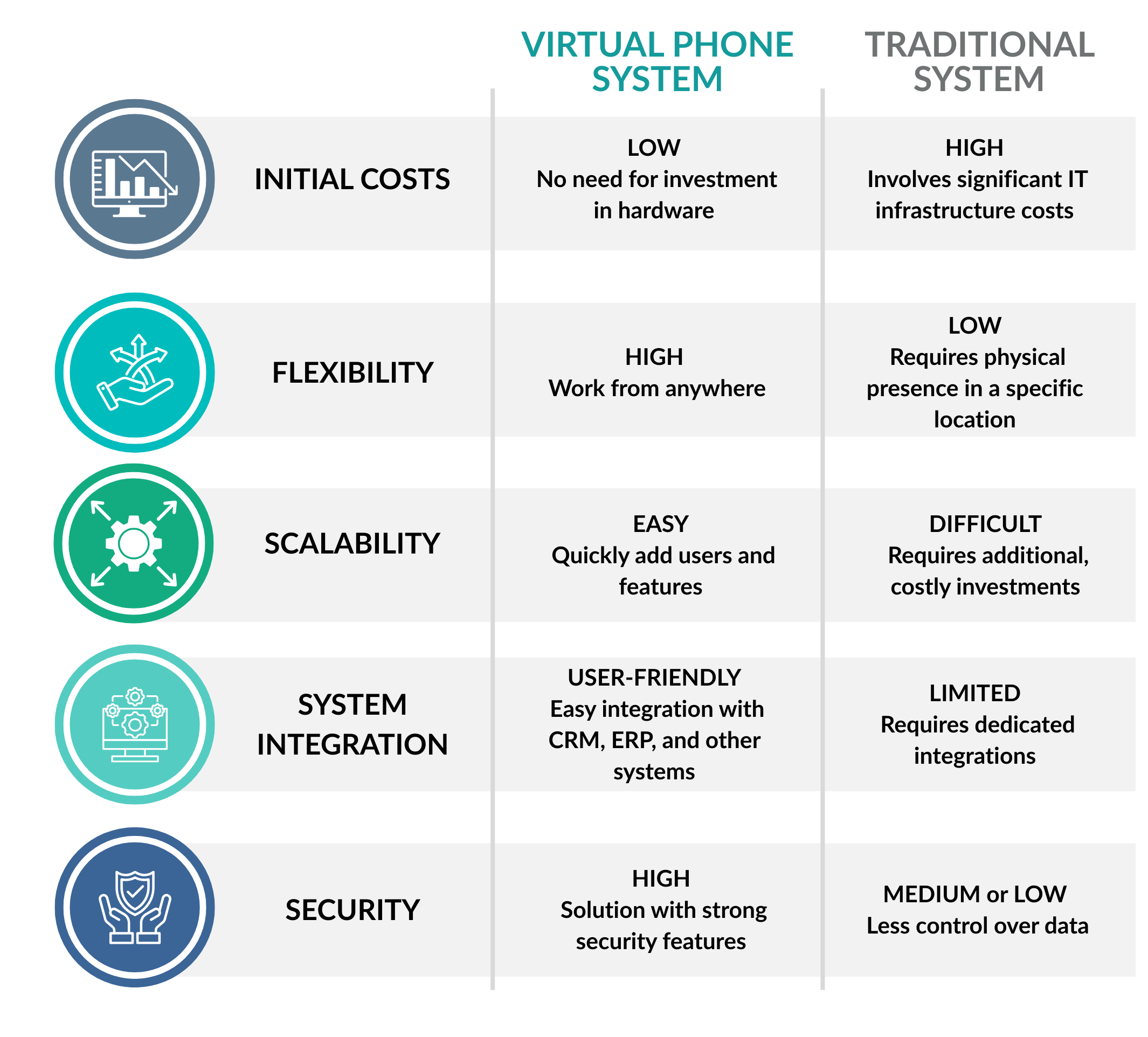Virtual phone system: Does your business really need one?

Virtual phone systems are no longer the future—they're the present. But does every business truly need one? In today’s competitive landscape, companies are constantly seeking to optimize their processes, especially when it comes to customer service—and virtual phone systems provide solutions that help streamline those operations. Key sectors like e-commerce, healthcare (e.g., clinics), catering, financial services, and solar energy—as well as the broader services industry—can benefit significantly from this technology.
In this article, we focus on how virtual phone systems can be applied across different industries and sectors. Let’s explore the situations in which this tool provides the most value - and when it’s worth investing in this technology to improve operational efficiency and bring structure to your customer service processes.
Benefits of a virtual phone system
- Cost saving- No need to invest in expensive IT infrastructure.
- Flexibility- Możliwość pracy z dowolnego miejsca na świecie.
- Scalability - Easily add new users and features as needed.
- Integration with other systems- Enables process automation through easy integration with CRM, ERP, and other tools.
- Improved customer satisfaction - Faster and more efficient customer service.
Who Can Benefit from a Virtual Phone System?
1. Small and medium-sized enterprises (SMEs)
Many SMEs that have adopted virtual phone systems report lower operational costs. For businesses with limited budgets, cost optimization is crucial. A virtual system helps reduce spending by eliminating the need for expensive telecom infrastructure. As a small business owner, you can cut costs without sacrificing service quality. Pay-as-you-go models also allow you to only pay for what you actually use.
2. Businesses with distributed teams
Remote work is no longer a novelty—but maintaining effective communication remains a challenge. Virtual phone systems help by supporting distributed teams, including call queue management based on location. Ideal for businesses that:
- Employ staff in multiple locations and need a system to manage them.
- Allow remote work, and many team members take advantage of this option.
- Communicate with clients across the country and require a support system tailored to this type of service.
A virtual phone system enables teams to work from anywhere in the country while ensuring smooth information flow. Facilitate collaboration regardless of location. Give your employees flexibility while maintaining high communication standards!
3. Service companies
Even the most basic virtual phone system can significantly enhance both team productivity and customer satisfaction. This is especially evident in the service sector, particularly for businesses operating online.
A large number of service companies report improved customer satisfaction after implementing a virtual phone system. In industries where fast and professional customer service is crucial—such as e-commerce, solar energy, catering, or medical clinics—a virtual phone system proves highly effective. It allows for easy call forwarding, call recording, and CRM integration, which boosts customer service efficiency and supports the speed and flexibility of any sales process. It helps increase customer satisfaction by providing fast and professional communication with the company.
4. IT companies
Many technology companies use virtual phone systems to quickly scale their operations. For young, fast-growing businesses, flexibility and scalability—especially in the early stages—are key drivers of growth. A virtual phone system enables the quick addition of new users and features without the need to invest in new infrastructure, offering virtually unlimited scalability. By adapting the solution to current needs, companies can grow in step with the market.
5. E-commerce
Virtual phone systems support the growth of online platforms and stores. In the e-commerce sector, where response time directly affects the sales process more than in many other industries, a virtual phone system can greatly improve service efficiency. Process automation, easy call tracking and analysis, and integration with sales systems are just a few of its advantages. Increase the efficiency of order handling—respond quickly to customer needs and optimize your sales processes.
Does your business really need a virtual phone system?
It depends on several factors:
- Customer service - If high-quality customer service is essential to your business, a virtual phone system can significantly improve team efficiency and customer satisfaction.
- Scale of operations - If your company is growing or handles a high volume of calls and communication through various channels, it needs flexible solutions. A virtual phone system might be the perfect fit.
- Budget - Dla firm z ograniczonym budżetem, wirtualne centrale oferują znaczne oszczędności nie tylko na infrastrukturze, ale i na kosztach operacyjnych lub związanych z rekrutacją.
- Work Model - If your company operates remotely or in a hybrid format, a virtual system provides the necessary flexibility.
If you answered “yes” to even one of these areas, a virtual phone system may be exactly what your business needs It's a strategic investment in your company’s future—one that can bring meaningful and measurable benefits. Assess your needs, explore your options, and make a well-informed decision to move your business forward.
Virtual phone system vs. traditional system
Comparing two approaches to managing business communication - a virtual phone system and a traditional system - can help you make an informed decision when choosing the best solution for your company.

The choice between a virtual phone system and a traditional system depends on the specific needs of your business. If flexibility and cost savings are your priorities, a virtual phone system is a solution worth considering.
Impact of virtual phone systems on workplace culture
The introduction of virtual phone systems not only changes technology but also influences the work culture within an organization. Here’s how these changes can manifest:
- Thanks to flexibility and remote access, teams can collaborate more effectively, regardless of their location. This promotes the development of distributed teams and knowledge sharing.
- Managers must adapt to managing dispersed teams, which often requires greater trust and employee autonomy.
- Remote work, enabled by virtual phone systems, allows employees to better balance professional and personal responsibilities, which in turn leads to higher job satisfaction at all levels.
- Virtual environments foster creativity and innovation, enabling the rapid testing and implementation of new ideas without the barriers associated with traditional infrastructure.
- By implementing virtual phone systems, companies gain full control over the customer service process. This allows for monitoring every stage of customer interactions. Employees have access to a complete history of contacts, which enables more personalized and efficient assistance. Additionally, managers can continuously analyze team performance, identify bottlenecks, and implement corrective actions as needed.
- Virtual phone systems enable companies to flexibly manage employee workloads during peak periods, such as holiday seasons or personnel changes. The system allows dynamic adjustments to the number of agents available for customer service, preventing queues and long wait times. As a result, the company can maintain a high level of customer service, regardless of internal staffing changes, ensuring operational continuity and customer satisfaction.
Implementing a virtual phone system: step by step
Have you decided to go with a virtual phone system? Great! Now, you’re probably wondering how to efficiently carry out the entire implementation process. Don’t worry, we’ll guide you through it step by step.
Identify your needs
Before you rush into choosing providers, take a moment to reflect on what you truly need. How many employees do you have? Which features are crucial for you? Do you need CRM integration? Or perhaps advanced call analytics are important? Make a list of must-have and nice-to-have features. Trust us – this will save you a lot of time later on!
Choose the right provider
The virtual phone system market is quite large, so you’ll need to do solid research. Look for a provider who not only meets your technical requirements but also offers strong support. Check reviews from other users and read case studies. And definitely take advantage of demo or trial versions – it’s like a test drive before buying a car!
Plan the migration
Alright, you’ve selected your provider. Now it’s time to create an action plan. Set a migration date, preferably during a period of lower activity in your company. Remember, you don’t have to move everything at once – you can start with one department and gradually expand.
Prepare your team
Even the best technology won’t work if people don’t know how to use it. Organize training sessions for your employees. Show them how to use the new features, how to forward calls, and how to use the mobile app. And most importantly, explain to them the benefits the new system will bring.
Establish a testing plan
Before officially going live, run a series of tests. Check every feature, every scenario. Are calls being forwarded correctly? Is the sound quality adequate? Are integrations with other systems working properly? It’s better to spot any issues now than during a conversation with an important client.
Monitor and optimize
Hooray, the virtual phone system is up and running! But your work doesn’t end here. Now it’s time to monitor. Track metrics such as missed calls, average waiting time, and customer satisfaction. Most good providers offer advanced analytics tools – make use of them!
Try It today!
Thulium meets the growing needs of modern entrepreneurs and will work perfectly for your company, regardless of the industry you're currently in. If you'd like to learn more, schedule a presentation and test the Thulium solution >>
Remember, you’re not alone in choosing the perfect solution for your company. Whether it’s a configuration issue or an idea for a new feature, share it with your provider. Implementing a virtual phone system is a process that requires time and attention, but the benefits it will bring to your business are worth it. With the right approach and planning, you’ll quickly notice improvements in communication, efficiency, and customer satisfaction.

Chcesz poznać Thulium AI w praktyce?
Umów się z nami na spotkanie i zobacz jak zyskać supermoce w obsłudze klienta!
